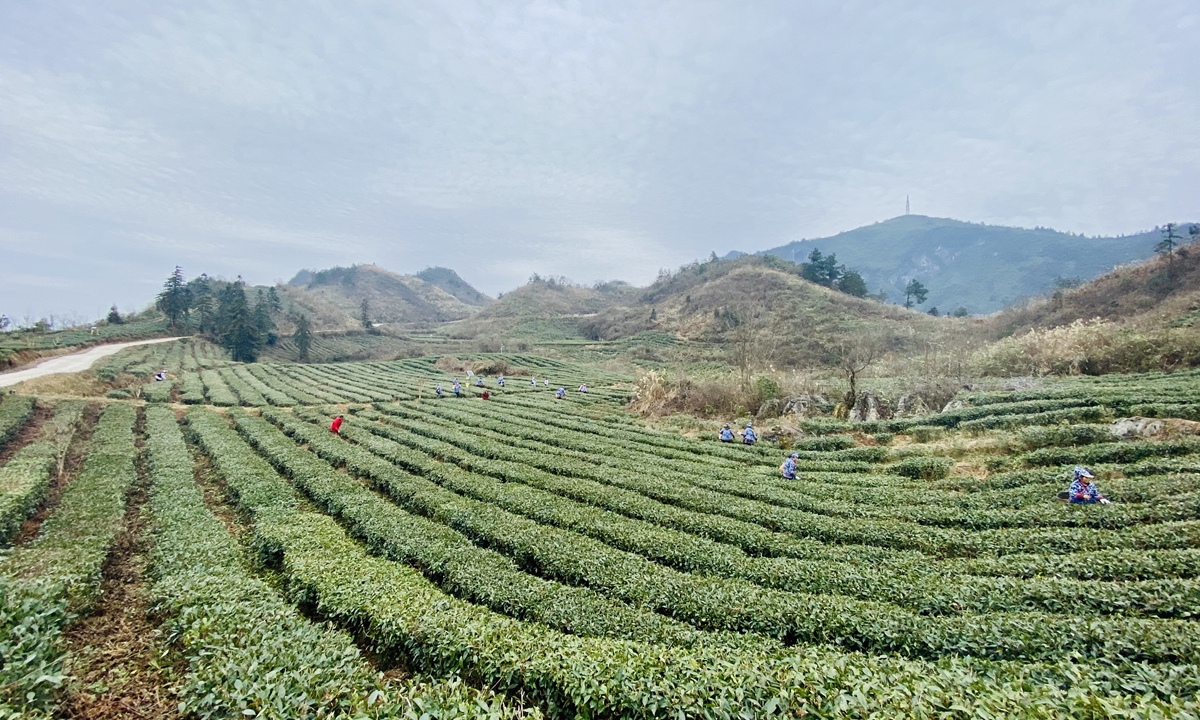
Farmers work at a tea garden while singing mountain songs in Sangzhi , Central China's Hunan Province. Photo by Wang Sheng
A 94-year-old lady lives a diligent, simple and independent life, with two-thirds of her small yard used to grow tender vegetables. She has been drinking tea for about 80 years, seeing it as a factor in her longevity.
She lives in Cangguanyu village of Sangzhi county, Central China's Hunan Province, a town with green mountains and clear rivers, which have turned into "golden and silver mountains". The mountains help diligent locals, like her, live a better life.
Every mountain has stories, and Sangzhi county has more than 10,000 mountains. Some partly attribute the mountains' two leaves -- white tea and reeds -- to the ending of absolute poverty in Sangzhi in 2019. Aside from the advantages of the mountains, people use their industrious hands, and the central and local governments provide subsidies and positive policies.
Mountain values
Many locals in the mountain city had the habit of drinking tea even during the previous period of poverty, so clever Sangzhi people decided to develop the tea industry. Located at a latitude of 29.4 and a longitude of 110.16, the county has an environment for growing tea with the mountains creating a favorable climate.
People in Sangzhi have planted about 79,000 mu (5,266 hectares) of white tea, which has anti-inflammatory functions, with more than 46 tea-processing enterprises including six above the industry scale, and a total output value of 228 million yuan ($34.86 million) in 2019.
With the increasing scale of the tea sector, the region has become more resilient in recent years against a return to poverty. "Even against the backdrop of COVID-19, Sangzhi increased the sales and value of white tea in 2020 compared with last year, partly through e-commerce platforms," said Wu Xiaodong, a local tea expert.
Wu explained that Sangzhi has built famous brands of white tea both at home and abroad, under many years of assistance from the China National Intellectual Property Administration (CNIPA), which helped Sangzhi win the geographical trademark of "Sangzhi white tea".
The mountains also have grown about 300,000 mu of reed leaves, providing opportunities for locals to harvest the leaves while sometimes singing mountain songs. As raw materials for foods such as Zongzi, the thin and soft leaves are rich in selenium and exude a fragrance, gaining favor all over the world.
Sangzhi has a large market share of reed leaves in China, but it's not enough. Local authorities expect that the large, flat leaves will bring more economic value in the near future. With the geographical trademark of "Sangzhi reed leaves" to be approved by the CNIPA, Sangzhi dreams of establishing integrated industrial parks for Zongzi leaves, extending its value chains, and developing a "leaf culture," with more products such as toothpaste and food plates.
Zhao Yunhai, chief executive of Sangzhi county, expects people worldwide to appreciate Sangzhi's white tea, Zongzi leaves and other agricultural products, making the mountain people richer.
"I am looking forward to further increases in the scale of Sangzhi's agricultural production, letting the Sangzhi people who make money outside return home and spend more time with their families," Zhao told reporters.
Industrious hands create fortunes
The 94-year-old lady hasn't lost the trait of diligence as time passes, and it is by diligence that Sangzhi ended poverty in 2019, after a poverty rate of 28.28 percent in 2014 among 480,000 people. It has created more fortunes through the values of the mountains.
Shi Peng, vice director of the photovoltaics department at the CNIPA, was assigned to Erhutian village as first secretary from Beijing in February 2017 and then to Cangguanyu village as first secretary.
He forgot how many trips back and forth he has made on the road from villages to downtown Sangzhi for the elimination of poverty, but he did not forget the past tears of some farmers caused by poverty, and the present smiles on their faces as they received dividends through the village's collective income, partly supported by the tea industry.
Although he will return to Beijing next year, he believes that Cangguanyu village won't return to poverty, due to its hard-working farmers and growing industries, further approvals of trademarks and patents by the CNIPA, and government services.
For example, Kanghua Reed Leaves Co in Sangzhi will improve processing conditions as the company expects an order of 500 million leaves from a Japanese company next year.
With reference to Hunan's 2020 standard for eliminating poverty, the annual per capita income should be more than 4,000 yuan, up from 3,700 yuan in 2019. In 2019, the average net income reached about 9,000 yuan per capita in Sangzhi.
Peng Likang, president of Kanghua Reed Leaves, said the company employs more than 9,000 households, with each earning more than 20,000 yuan a year, and 60,000 farmers working for the company in Hunan and Hubei provinces have risen out of poverty.
Liu Zhenyuan, president of Zhangjiajie Wanbaoshan Tea Industry Co, said that the company provides thousands of jobs for tea farmers in Sangzhi with an average annual income of 10,000 yuan per family.
Hunan Xiangfeng Tea Group increased the total income of 75,000 tea farmers here by 14 million yuan in 2019.
Liu Hua, director of the China Office of the World Intellectual Property Organization, said that Sangzhi provides a typical example to the world of eliminating absolute poverty through the intellectual property sector such as using geographical trademarks.
Experts said that more cooperation between the relevant departments of intellectual property in Hunan and Beijing, and new technologies that are being deployed, will help Sangzhi's growth through mountain values.